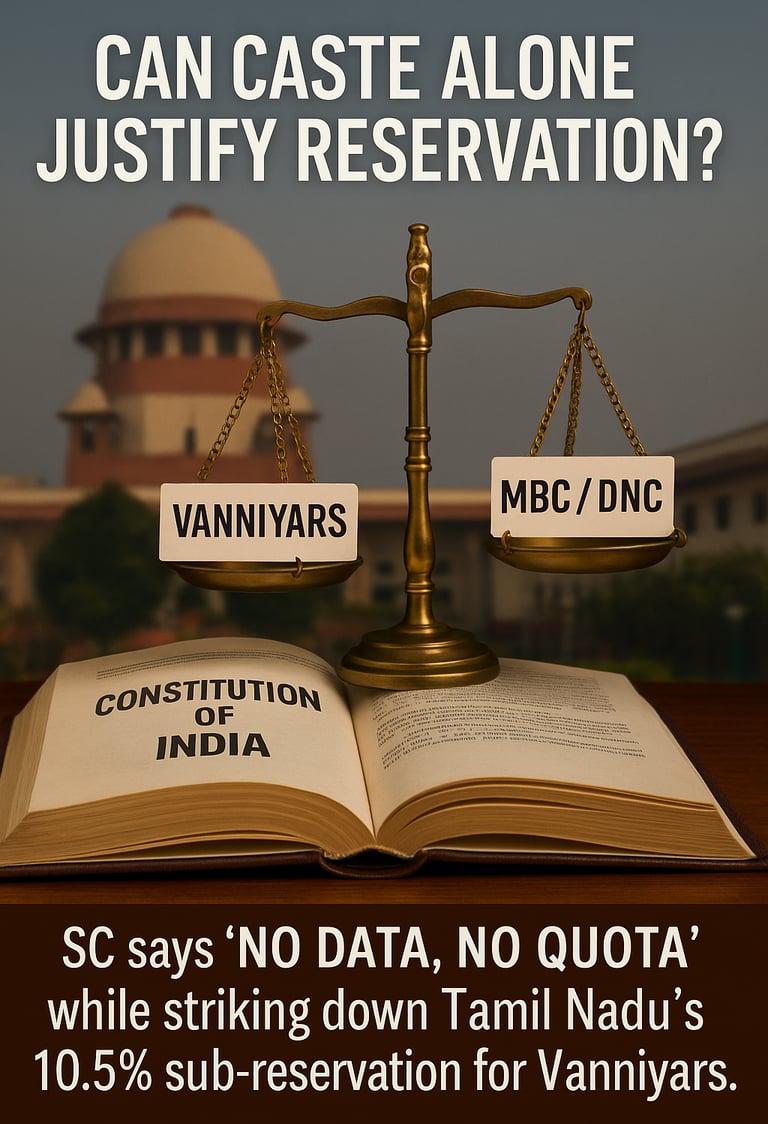Case Analysis: Pattali Makkal Katchi v. A. Mayilerumperumal & Others
Equivalent Citation: 2022 (SC) 333 ; Date of Judgment: 31/03/2022
CONSTITUTIONAL LAW CASESCASE SUMMARIES
Guru Legal
8/6/20252 min read


Case Name: Pattali Makkal Katchi v. A. Mayilerumperumal & Others
Equivalent Citation: 2022 (SC) 333
Bench: Justice L. Nageswara Rao & B. R. Gavai.
Petitioner: Pattali Makkal Katchi
Respondents: A. Mayilerumperumal & Others
Date of Judgment: 31/03/2022
Introduction:
The present case raised concerns about the Constitutionality of the Tamil Nadu Special Reservation Act 2021, which included internal reservation for the Vanniakula Kshatriyas (Vanniyars), a specific caste group, within the 20% quota for Denotified Communities (DNCs) and Most Backward Classes (MBCs). This Act was contested on the grounds that it was caste-based and lacked sufficient data to justify such sub-classification.
Facts of the Case:
The 2021 Act, passed by the Tamil Nadu Government, gives the Vanniakula Kshatriyas a 10.5% reservation out of the 20% quota allotted to MBCs and DNCs. The state's Backward Classes Commission made the recommendation that led to this action. However, several groups opposed this Act, contended that it was passed without sufficient research or adequate study and was solely based on caste.
The Act was declared unconstitutional by the Madras High Court because of lack of sufficient data and it came before the 105th Constitutional Amendment, which restored state power to identify SEBCs.
Issues Raised:
Whether the 2021 Act is constitutionally valid, especially under Article 14, 15, and 16?
Whether the State has the legislative authority or competence to pass the Act in view of the 102nd and 105th Amendments?
Whether caste-based internal reservation is allowed?
Whether there was sufficient quantifiable data to justify the 10.5% sub-quota?
Case Analysis:
The Supreme Court previously recognized the power of States to control backward classes or authority to sub classify backward classes as established in the Indra Sawhney case. However, court emphasized that this further classification needs to be based on social and educational indicators of backwardness, rather than mere caste affiliation
The Court concluded that the Tamil Nadu Government did not rely on any recent or quantifiable data to justify the 10.5% reservation for the Vanniakula Kshatriyas. While the Court agreed that sub-classification is not inherently unconstitutional, the method has to be reasonable and evidence based.
The Court also noted that the 105th amendment which “confirmed” the power of the States to determine whether a group is backward or not, could not be applied through to justify the act that was passed in 2021. Hence, the State’s power at that time was limited by the 102nd Amendment.
Judgment:
The Supreme Court upheld the ruling of the Madras High Court that struck down the 2021 Act. The Supreme Court held that Sub-classification is permissible, but must be reasonable and should be factual based data and there was no justification brought forward to support the claim that Caste alone be the basis for internal reservation. The 2021 Act lacked quantifiable data, which makes it unconstitutional. There was no violation of Article 342-A since the Act did not “identify” a new SEBC. Sub classification was accepted but required to be reasoned and grounded in factual data.
Conclusion:
The significance of data-driven policies in reservation laws was reaffirmed by this case. While states may classify backward classes internally, the Court ruled that such actions must adhere to equality principles and constitutional protections. Due to inadequate justification and timing before the 105th Amendment, Tamil Nadu's attempt was unsuccessful.
